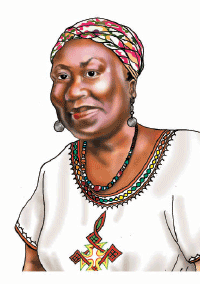The recent happenings in the country make the heart tend towards despair again, especially the political moves in various quarters calculated at thwarting the democratic process leading on to 2015. One hopes the Nigerian electorate will not be hoodwinked, but there is reason to fear. A friend recently told me that the results of elections in Nigeria could make nonsense of some long-standing theories of political scientists. That is why my mind went to a piece I had written some years ago, which has also been published in my book, Daybreak Nigeria: This Nation Must Rise! Excerpts, with some revisions.
Nigeria. 1. Country in West Africa, on the Atlantic; a member of the Commonwealth. 2. A composed word, made up of Niger and –ia. Niger: River in West Africa; Country in West Africa. –ia: Suffix in the names of certain diseases, and of certain plants and animals.
Lord, have mercy! It never really struck me before settling down to write this piece, that one of the primary functions of the suffix on the name of my beloved country is for designating diseases: pneumonia, amnesia, anaemia, aphasia, bulimia, diphtheria, dyslexia, malaria! Who on earth did this to us?
Nigeria, a land through which flows the great River Niger – a fact which alone should have ensured for all time the prosperity of its inhabitants. Who does not know that big rivers are sources of considerable enrichment, like the Nile was to Egypt? Then, as if to signal Nature’s determination to so bless this land, a second river flows from the other direction (the Benue), joins forces with the Niger in Lokoja, and the duo continue their southward journey majestically, pouring out their waters into the Atlantic Ocean atop a riverbed concealing some of the richest marine and mineral resources the world knows.
Nigeria, a diseased country living up to the primary functional meaning of its suffix? That seems to be the reality being witnessed, most dishearteningly, for ours is a nation languishing in the throes of the most incomprehensible degree of want and deprivation, whereas we have all that is required to make us a haven to be sought after by all. Is there truly malediction in that suffix? What about other nations whose names follow the same pattern, ending in –ia? Liberia: case confirmed; Tunisia, Algeria: not much known but for the Arab Spring; Bulgaria, Latvia, Romania, Russia and other eastern European nations: many still crisis-ridden but struggling to re-brand, with communism so discredited; Italia: quite different from most other western European countries, you’d agree, with the rule of the mafia (-ia again!) holding sway. There does seem to be something to this suffix…
But then, Malaysia. A country with a history very much like ours, united only as a nation in 1963 from the various British colonies which had existed since the late 18th century. It has experienced political upheavals and other troubles, just like we have. But then, something happened, and Malaysia is known today as a country with enviable GDP and per capita figures, rigorously pursuing its vision for industrialisation. So, what happened?
I am convinced there was a special session of the Parliament of Malaysia during which the President challenged members directly on the sorry state of the nation: what was keeping the country down, preventing it from fully realising its potential? He invited members to brainstorm on the issue and as they did, different ideas came up. Some felt the former colonial masters were the problem, still in the background pulling strings and knocking Malaysians’ heads together; others felt the nation was doomed because it was a concocted entity made up of different ethnic groups.
Finally, an old member rose and cleared his throat: “Fellow Malaysians, I have thought long and hard about this matter”, he said, “and have come to the conclusion that the problem has to do with our name.” Silence. Bewilderment. “Do you not see that Malaysia rhymes with malaria, aphasia, anaemia – all of them diseases? That is the source of our trouble.” A young, hot-blooded member jumps up: “Do we have to change our name then? You want us to be called by the name of some minority group?”
“Ah, patience, young man, patience! I have also checked and found that not all words ending in –ia relate to diseases. In fact, some of the world’s most beautiful flowers have that same suffix: begonia, zinnia, bouvardia, heliconia, gardenia, watsonia, freesia, and others. I therefore solemnly move that a bill be passed this day, stating that Malaysia chooses to be associated from now NOT with the first meaning of its suffix but the second. We reject the negative association with diseases but rather, with flowers and all their beauty represents.” Thunderous applause.
(Now, for all the sceptics out there who doubt the veracity of this account, just open your eyes wide the next time the advertisement for Malaysia comes up on CNN and see the incredible flora and fauna displayed.)
Now, to you Nigeria, my beloved country, here is my prayer for you:
May your bodies of water swarm with tilapia;
May your desert lands be covered with acacia*;
And may you know boundless alaafia.
Peace to you, Nigeria.
(*Check out acacia on Wikipedia and be wowed by the plant’s incredible variety of uses. Northern Nigeria has at least the acacia senegal, one of 1,300 species found around the world, which produces true gum Arabic.)














